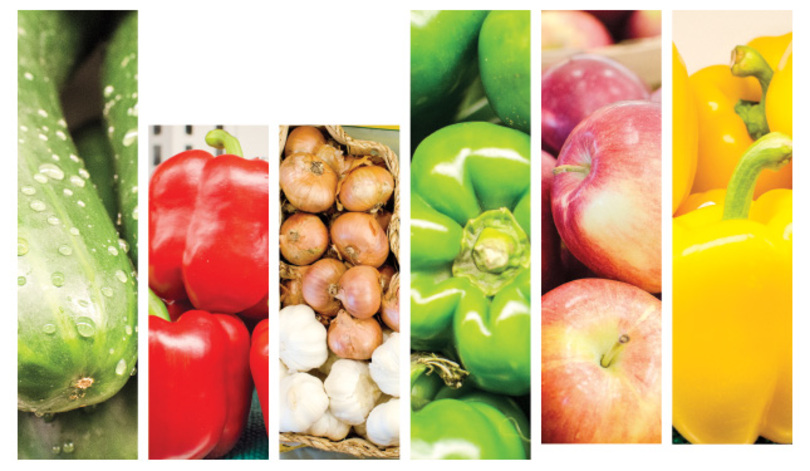Acquired taste: Co-op provides South Side residents with fresh food options
The South Side of Syracuse used to be considered a “food desert.”
A walk to the grocery store is a trek from the corner of East Colvin and South Salina streets, and the remaining options in between are convenience stores and Kentucky Fried Chicken.
But now, after about five years of work, the Eat to Live Food Cooperative has opened its doors on South Salina Street, which means South Side residents can now buy fresh produce within walking distance.
The community brought up the need for better access to cheap, healthy food options at a Southside Community Coalition meeting about five years ago. The Southside Community Coalition and Syracuse University’s South Side Initiative Office, then chose and formed the co-op business model and have been working on the project with the community since.
Eat to Live was created to introduce a healthy eating and healthy food education to the community, said Jim Diamond, the general manager.
The lack of nearby grocery resources played a large role in picking a location for the cooperative, which is in an area of the city with the highest-density walking population, he said.
The store is open to the public, but any customer can become a member for a $100 fee, which can be broken into a payment plan. Members elect a board of directors, go to membership meetings and vote on the initiatives of the co-op, including what to carry, Diamond said.
He brought in fresh produce and other products he thought would be popular, but he said he left room on the shelves and in the coolers so the members can decide how to fill them.
“Me deciding what we carry and what they’re going to eat, that’s not really fair,” Diamond said. “Because I’m shopping here, but I’m not the demographic. We want our membership, which is our ownership, to dictate what we bring in.”
After having owned his own grocery stores, Diamond said he wasn’t sure he wanted to go back to the long hours of the retail grind for just any store. But he said he couldn’t pass up the opportunity when the South Side Initiative Office began working to make residents’ suggestions for a food co-op a reality.
“I didn’t necessarily want to get back into retail, but when this came out and I read about it and I started researching it, this is exactly what I wanted to be a part of,” Diamond said. “Something that’s bigger than me, that my family and I can be a part of.”
Eat to Live Cashier Jacob Everson was also drawn to working at the co-op because he said he felt connected to the cause, despite not having worked much as a cashier.
“I’ve worn many hats. From cooking in your Red Lobster to driving your taxis, I’ve done everything,” Everson said.
When he found out about the co-op, the business model reminded him of the kind of store he would have liked to open up himself. What makes the co-op different, he said, is respect.
“People come in here with respect, they look at this place respectably, they carry it with respect,” Everson said.
In this way, Everson said he thinks the co-op is doing its job. He said customers like the location and that it is filling their need for a real grocery store rather than another corner store.
Eat to Live Board President Shirley Rowser said the community voiced this need for cheaper, healthier and more accessible food options in a Southside Community Coalition meeting about five years ago.
“Our goal is to provide excellent customer service,” Rowser said, adding that the staff went through extensive training to learn how to treat their customers, who they refer to as part-owners. “We want to make sure when people walk in the door they are pleasant and helpful.”
Now, the board has switched the focus to building up its membership, which was difficult before, when they didn’t have a building. Since opening last Tuesday, Rowser said, the community has started reaching out to the board to learn more about how to become a member.
Because the co-op is a nonprofit, a perk of membership is that the leftover profit goes back to members through a refund program, Rowser said. If there is excess profit, the members who spend more money at the co-op will get a larger cut, she said.
Rowser said the goals of the board are to support local farmers, offer affordable products and educate members on healthy eating and cooking with member workshops.
“I’m feeling optimistic about the whole thing, I just want to see it move forward,” Rowser said.
Bob Dougherty, Syracuse District 3 common councilor, said this is a long-awaited opportunity, because it has always been difficult for people in the inner city and on the South Side to get reasonably priced groceries.
Other than a Tops Friendly Markets about a mile south of the cooperative, he said, there are few options outside of corner stores, and few options within the stores themselves.
“You send a kid to the corner store to get something to eat and they come back with junk,” Dougherty said. “And that’s what they have, for the most part.”
Though the community tried to persuade corner stores to carry produce, Dougherty said, their efforts have been unsuccessful. The new food cooperative will finally give the community what they need, he said, which is simply having a choice.
Published on October 22, 2013 at 1:54 am







